Types of Solid Waste & Segregation
Types of Wastes
Some of the major types of solid waste are
- Municipal Solid Waste (MSW)
- Hazardous Wastes
- Industrial Wastes
- Agricultural Wastes
- Bio-medical Wastes
Municipal Solid Waste (MSW)
The term municipal solid waste (MSW) is generally used to describe most of the non-hazardous solid waste that requires routine collection and transport to a processing or disposal site. Sources of MSW include household, commercial facilities, institutions and also industrial facilities. However, MSW does not include wastes from industrial processes, construction and demolition debris, sewage sludge, mining waste or agricultural wastes. MSW is also called as trash or garbage. In general, domestic waste.
Wet Waste
Vegetable and meat , leftover food, eggshells etc
Dry Waste
Paper, plastic, Tetra-pack, plastic cans, newspaper,
glass bottles, cardboard boxes, aluminium foil, wood
pieces, etc.
Hazardous Wastes
Hazardous wastes are those that can cause harm to human and the environment. Further Classified as:-
Toxic Wastes
Toxic wastes are those that are poisonous any may even have acute or immediate effect on human or animals. Examples: Pesticides.
Reactive Wastes
Reactive wastes are those that have a tendency to react vigorously with air or water are unstable to shock or heat, generate toxic gases or explode during routine management. Examples: Gun Powder.
Ignitable Wastes
Are those that burn at relatively low temperatures (< 60 °C) and are capable of spontaneous combustion during storage transport or disposal. Examples: Gasoline, Paint thinners an Alcohol.
Corrosive Wastes
Are those that destroy materials and living tissues by chemical reactions? Examples: acids and base.
Infectious Wastes
Included human tissue from surgery, used bandages and hypoderm needles hospital wastes.
Industrial Wastes
These contain more of toxic and require special treatment. These are generally generated in Food processing industries, metallurgical chemical and pharmaceutical unit’s breweries, sugar mills, paper and pulp industries, fertilizer and pesticide industries are major ones which discharge toxic wastes. During processing, scrap materials, tailings, acids etc.
Agricultural Wastes
The waste generated by agriculture includes waste from crops and live stock. This waste does not pose a serious problem as most of it is used e.g., cow dung is used for manure, straw is used as fodder. Some agro-based industries produce waste e.g., rice milling, production of tea, tobacco etc. Agricultural wastes are rice husk, degasses, ground nut shell, maize cobs, straw of cereals etc.
Bio-Medical Wastes
Bio-medical waste means any waste, which is generated during the diagnosis, treatment or immunisation of human beings or animals.
Waste Minimization
Waste production can be minimized by adopting the 3 R’s principle:
Reduce, Reuse, and Recycle.
They conserve natural resources, landfill space and energy. Also, siting a new landfill has become difficult and more expensive due to environmental regulations
Reduce the amount and toxicity of garbage and trash that is discarded. Source reduction is when products are designed, manufactured, packaged, and used in a way that limits the amount or toxicity of waste created.
Reuse by cleaning the item and using the materials again. Also repairing things that are broken.
Recycle products wherever possible, which includes buying recycled products i.e., recycled paper books, paper bags etc.
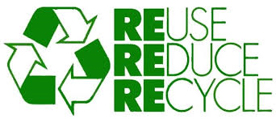
Don’t Let the Waste Go Waste
Household waste, non-hazardous commercial and industrial waste, construction waste, organic waste, hazardous industrial and commercial waste: the diversity of waste categories makes their collection a logistical challenge.
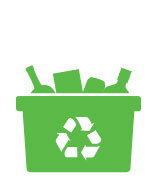 Bin
Bin
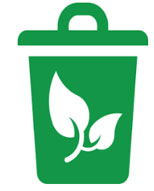 Bulk Container
Bulk Container
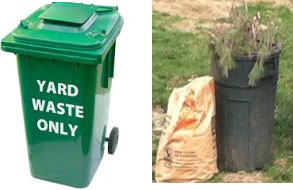 Yard Waste Cans
Yard Waste Cans
Yard waste collection includes grass clippings, leaves, tree limbs, brushes, pruning from trees and bushes, etc.

Waste of the same nature is gathered in collection centers where it is compressed before being sent to an appropriate sorting or treatment site.
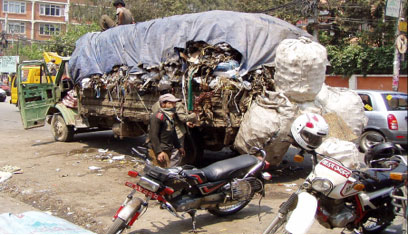 Primitive methods of trash collection are things of the past.
Primitive methods of trash collection are things of the past.
 Modern collection and clean collection technologies.
Modern collection and clean collection technologies.
All solid waste is transported to specialized sorting centers. Waste resulting from the selective collection of household waste and non-hazardous industrial and commercial waste is sent to high performance sorting centers managed by trained and certified technicians and staff.
Right Techniques
- Leakproof and re-usable waste containers, constructed of corrosion resistant materail that will not absorb water, grease, or oil.
- Reusable containers that emptied manually are of maximum 35 gallon capacity.
- Reusable waste containers that are emptied mechanically are designed to prevent spillage or leakage during collection and transportation.
- All types are containers are handled in a manner keeping in mind the health and safety of the company’s personnel who are trained in safe handling techniques and proper operations.
- All operating staff should use personnel protective equipment (PPE) such as gloves, safety glasses, and safety shoes, and scavenging is prohibited to avoid spillage and injury.
